If you’re looking for a natural way to improve your overall health, consider adding flax seeds to your diet. These tiny but powerful seeds are packed with essential nutrients that can help regulate blood pressure and hormone levels.
Flax seeds have been used for centuries for their medicinal properties, and recent research has confirmed their numerous health benefits. They contain high levels of omega-3 fatty acids, lignans, and fiber, which contribute to their impressive nutritional profile.
De viktigaste slutsatserna:
- Flax seeds are a natural and nutritious way to regulate blood pressure and hormone levels.
- They are rich in essential nutrients such as omega-3 fatty acids, lignans, and fiber.
- Regular consumption of flax seeds can improve heart health, hormonal balance, weight loss efforts, skin health, digestive health, women’s health, and hair growth.
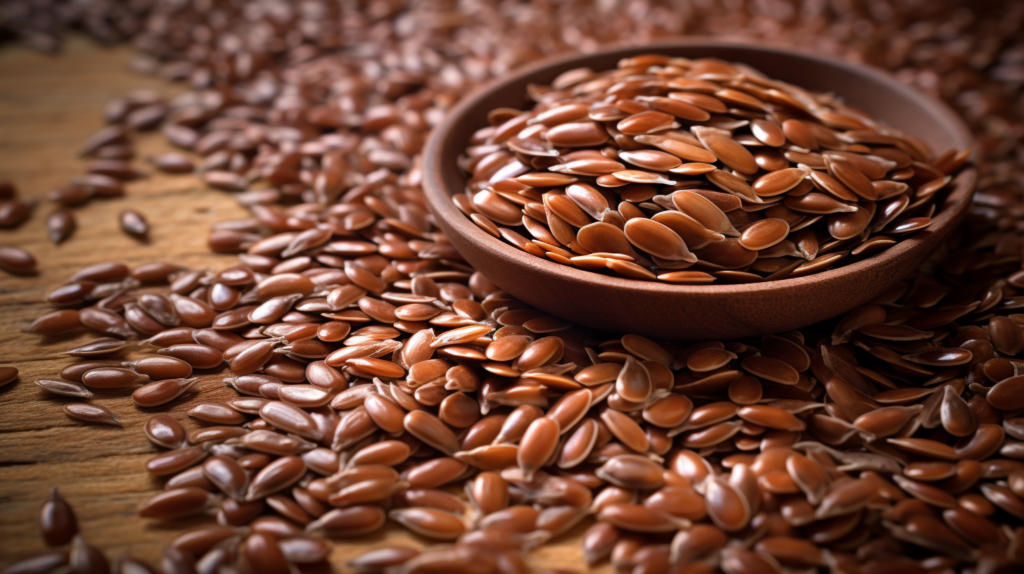
The Nutrition Profile of Flax Seeds
Flax seeds are a nutritional powerhouse, packed with a variety of essential nutrients that can benefit your overall health. These tiny seeds are an excellent source of dietary fiber, protein, and healthy fats, including omega-3 fatty acids.
One of the most significant advantages of flax seeds is their high content of alpha-linolenic acid (ALA), a type of omega-3 fatty acid that has been linked to numerous health benefits, including improved heart health, lower inflammation levels in the body, and a reduced risk of certain types of cancer.
| Näringsämne | Amount per 100 grams |
|---|---|
| Kalorier | 534 |
| Protein | 18.3 grams |
| Fett | 42.2 grams |
| Kolhydrater | 28.9 grams |
| Fiber | 27.3 grams |
| Mangan | 220% of the Daily Value (DV) |
| Thiamin | 31% av DV |
| Copper | 29% of the DV |
| Magnesium | 28% av DV |
| Phosphorus | 27% of the DV |
| Selenium | 10% av DV |
Additionally, flax seeds are packed with lignans, which are plant compounds that have both antioxidant and estrogenic properties. These compounds have been linked to a reduced risk of breast cancer and improved menopausal symptoms.
Their high fiber content also makes them a great addition to any diet, as fiber can help regulate blood sugar levels, promote feelings of fullness, and keep the digestive system functioning properly.
Incorporating flax seeds into your diet is an easy way to boost your overall nutrient intake and support your health in numerous ways.
Flaxseed Benefits for Heart Health
Flax seeds are small, nutty-flavored seeds that have been shown to have a positive impact on heart health. One of the key benefits of flax seeds is their ability to lower cholesterol levels, which is a major risk factor for heart disease. A study published in the Journal of Nutrition found that consuming flax seeds daily for three months led to a significant reduction in LDL cholesterol levels.
In addition to lowering cholesterol, flax seeds also have anti-inflammatory properties that can help reduce the risk of heart disease. Chronic inflammation is linked to an increased risk of heart disease, and flax seeds have been shown to reduce inflammation markers such as C-reactive protein.
The high fiber content of flax seeds also plays a role in heart health. Fiber helps regulate blood sugar levels, which can reduce the risk of developing type 2 diabetes, another major risk factor for heart disease. Additionally, fiber helps promote feelings of fullness, which can prevent overeating and promote a healthy weight, another important factor in heart health.
To reap the benefits of flax seeds for heart health, incorporate them into your diet in a variety of ways. Add ground flax seeds to oatmeal, smoothies, or yogurt, or use them as a crunchy topping on salads or roasted vegetables. Flaxseed oil can also be used as a healthy fat in salad dressings or drizzled over cooked vegetables.
Incorporating flax seeds into your diet is an easy and delicious way to support heart health. With their ability to lower cholesterol, reduce inflammation, and promote healthy blood sugar levels and weight management, flax seeds are a powerful addition to any heart-healthy diet.

Flaxseed Benefits for Hormonal Balance
Flax seeds contain compounds called lignans, which are phytoestrogens that mimic the effects of estrogen in the body. As a result, consuming flax seeds may help regulate hormonal imbalances in both men and women.
Research has suggested that flax seeds may have a positive impact on menopausal symptoms, such as hot flashes and night sweats. A study conducted on postmenopausal women found that consuming flax seeds reduced the frequency and severity of hot flashes. Another study found that flax seeds improved overall quality of life and reduced the intensity of hot flashes in women.
Flax seeds may also support reproductive health in women. In one study, women who consumed flax seeds experienced an increase in luteal phase length, which is important for pregnancy. Additionally, flax seeds may help reduce the risk of certain hormone-related cancers in women, such as breast cancer and ovarian cancer.
For men, flax seeds may help regulate testosterone levels. A study found that consuming flax seeds reduced the risk of developing prostate cancer, which is a hormone-related cancer in men. Another study found that flax seeds improved sperm quality in men with fertility issues.
It is important to note that while flax seeds may have hormonal benefits, they should not be relied upon as a sole treatment for hormonal imbalances or medical conditions. If you have concerns about your hormonal health, it is important to speak with a healthcare professional.
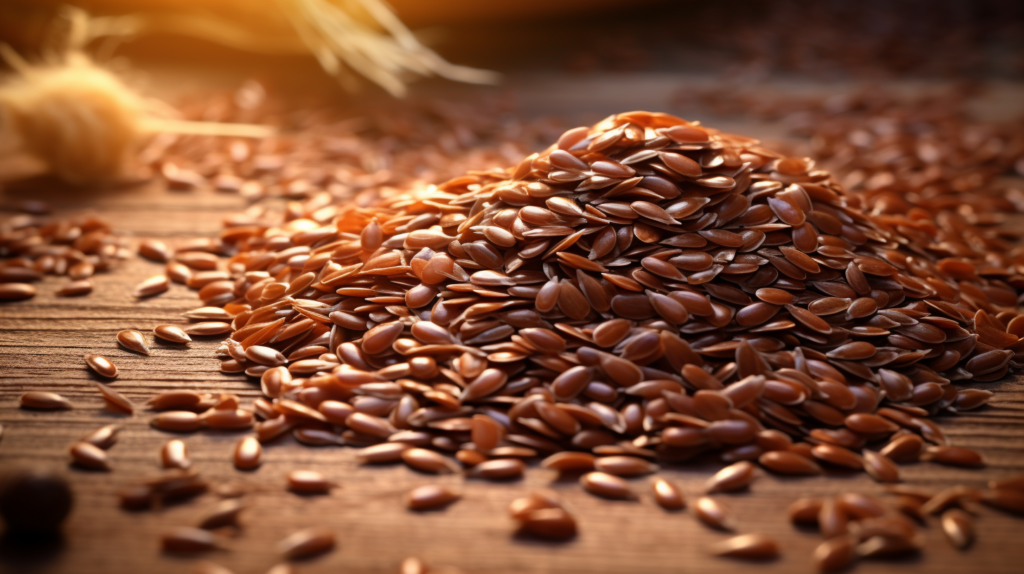
Flaxseed Benefits for Weight Loss
If you’re looking to shed some extra pounds, incorporating flax seeds into your diet may be a smart move. Flax seeds are a great source of dietary fiber, which can help you feel fuller for longer and reduce your overall calorie intake.
The fiber content in flax seeds can also help regulate blood sugar levels, which can reduce the likelihood of sudden cravings or overeating. Additionally, flax seeds may have an impact on fat metabolism, as they are rich in alpha-linolenic acid (ALA), an omega-3 fatty acid that may promote fat burning.
One study published in the Journal of Nutrition found that overweight individuals who supplemented their diet with flax seeds experienced greater weight loss and reductions in body mass index (BMI) than those who did not consume flax seeds.
However, it’s important to note that flax seeds should be consumed in moderation as part of a balanced diet. Eating too many flax seeds can cause digestive issues such as bloating, gas, and diarrhea.
To add flax seeds to your diet, try sprinkling them on top of your morning cereal or yogurt, incorporating them into smoothies, or baking them into homemade granola bars. Just remember to start with small amounts, and gradually increase your intake as your body adjusts.
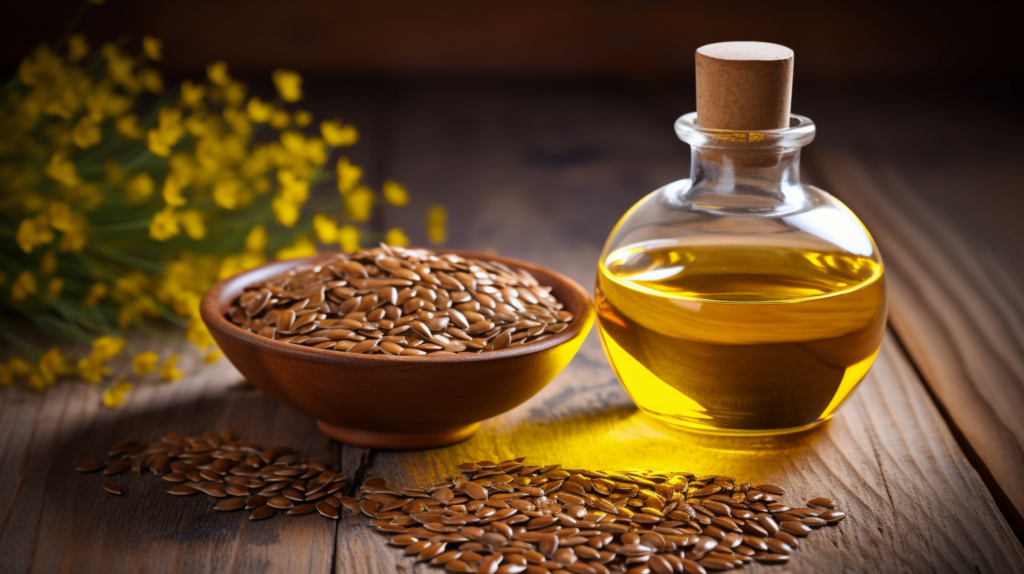
Flaxseed Benefits for Skin Health
Adding flaxseeds to your diet not only benefits your heart and hormone levels, but also your skin health. The essential fatty acids found in flaxseeds help reduce inflammation, which is a primary cause of skin conditions like psoriasis, eczema, and acne.
In addition, flaxseeds are rich in lignans, which have been found to promote hydration and elasticity in the skin, preventing wrinkles and fine lines. Lignans also possess antioxidant properties that protect the skin from damage caused by free radicals and environmental toxins.
If you have skin conditions like eczema or psoriasis, incorporating flaxseeds into your diet can help reduce inflammation and soothe irritated skin. You can also use flaxseed oil topically as a natural moisturizer to promote skin health.
Incorporating flaxseeds into your diet can help improve your overall skin health and appearance, as well as provide numerous other health benefits.
Flaxseed Benefits for Digestive Health
Adding flax seeds to your diet can offer a range of digestive benefits. Thanks to their high fiber content, these tiny seeds can promote regular bowel movements, prevent constipation, and support gut health. Additionally, the soluble fiber found in flax seeds can help regulate blood sugar levels and promote feelings of fullness, making them a useful tool in weight management as well.
However, it’s essential to introduce flax seeds to your diet gradually, as their high fiber content can cause digestive issues for some individuals. Start with a small amount and gradually increase as your body adjusts. Also, be sure to drink plenty of water when consuming flax seeds, as they can absorb water and swell in the digestive tract.
To reap the digestive benefits of flax seeds, try adding them to your morning smoothie or oatmeal. You can also sprinkle them on top of salads or incorporate them into homemade baked goods like muffins or bread.
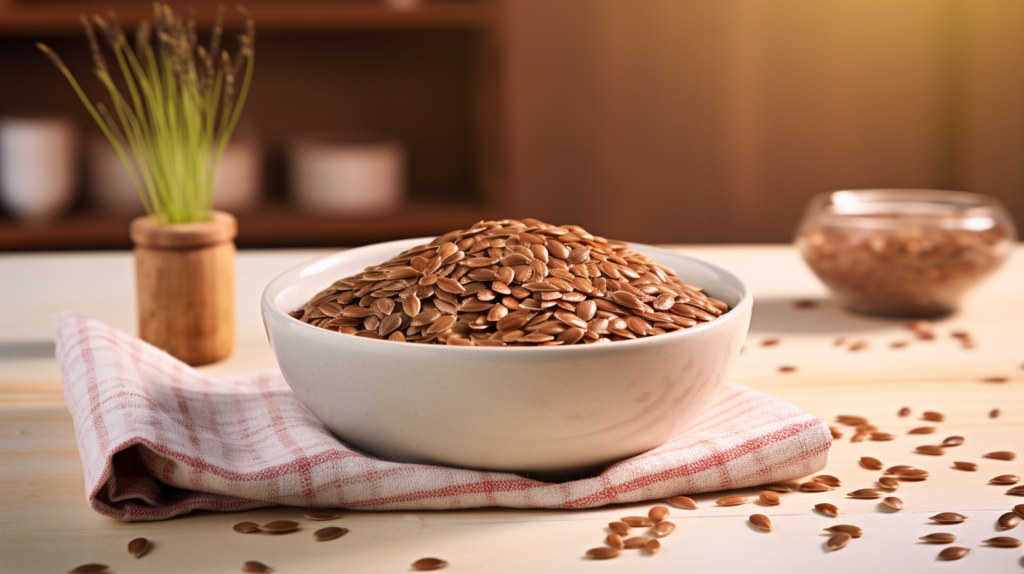
Flaxseed Benefits for Women’s Health
Flaxseeds offer numerous benefits, especially for women. They are rich in lignans, which are plant compounds that have estrogenic properties. This estrogen-like activity makes flaxseeds particularly beneficial for women’s hormonal health. Here are some of the ways in which flaxseeds can benefit women:
- Managing Menstrual Symptoms: Flaxseeds can help alleviate symptoms associated with menstruation, such as cramping and bloating. Their anti-inflammatory properties may help reduce inflammation in the body and ease menstrual discomfort. Additionally, research has shown that flaxseeds may help regulate menstrual cycles.
- Supporting Reproductive Health: Flaxseeds may help support reproductive health in women. The lignans in flaxseeds can help regulate estrogen levels in the body, which is important for healthy reproductive function. Some studies have even suggested that flaxseeds may help improve fertility in women.
- Reducing the Risk of Hormone-Related Cancers: The lignans in flaxseeds may also help reduce the risk of certain hormone-related cancers, such as breast and ovarian cancer. The phytoestrogens in flaxseeds can bind to estrogen receptors in the body, potentially blocking the effects of stronger estrogens that can lead to tumor growth.
Overall, flaxseeds can be an excellent addition to a woman’s diet. They offer numerous health benefits, particularly for hormonal and reproductive health. However, it is important to note that consuming too much flaxseed may have negative effects, such as digestive issues. It is recommended to consume flaxseeds in moderation, starting with small amounts and gradually increasing intake.
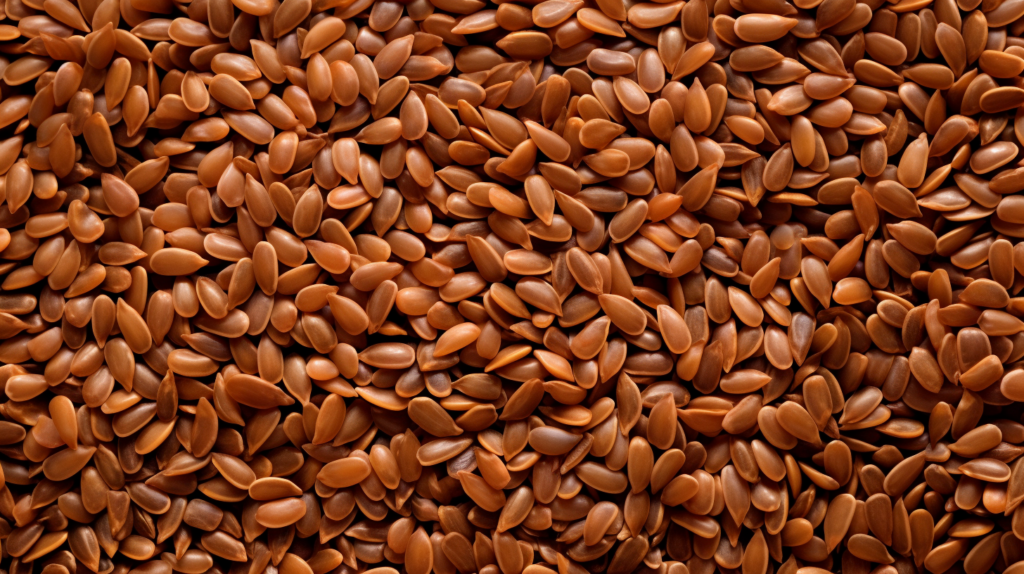
Flaxseed Benefits for Hair Growth
If you’re looking for a natural way to promote hair growth and improve the health of your hair, flax seeds may be just what you need. These tiny seeds are packed with nutrients that can nourish your hair from the inside out.
One of the key benefits of flax seeds for hair growth is their omega-3 fatty acid content. Omega-3s are essential for healthy hair follicles and scalp, and can help prevent thinning and hair loss. Flax seeds are also a rich source of lignans, which have been shown to improve hair texture and thickness.
Additionally, flax seeds are high in antioxidants which can help protect your hair from damage caused by free radicals, pollution, and other environmental factors. They also contain vitamin E, which is known to improve scalp circulation and promote healthy hair growth.
One easy way to incorporate flax seeds into your diet for hair health is by adding them to your morning smoothie or yogurt. You can also sprinkle them on top of salads or cereal, or mix them into baked goods like muffins and bread.
However, it’s important to note that excessive consumption of flax seeds may have potential side effects, such as digestive issues for some individuals. As with any dietary supplement, it’s best to consult with your healthcare provider before adding flax seeds to your diet.
Overall, adding flax seeds to your diet can be a great way to support healthy hair growth and improve the overall health of your hair.
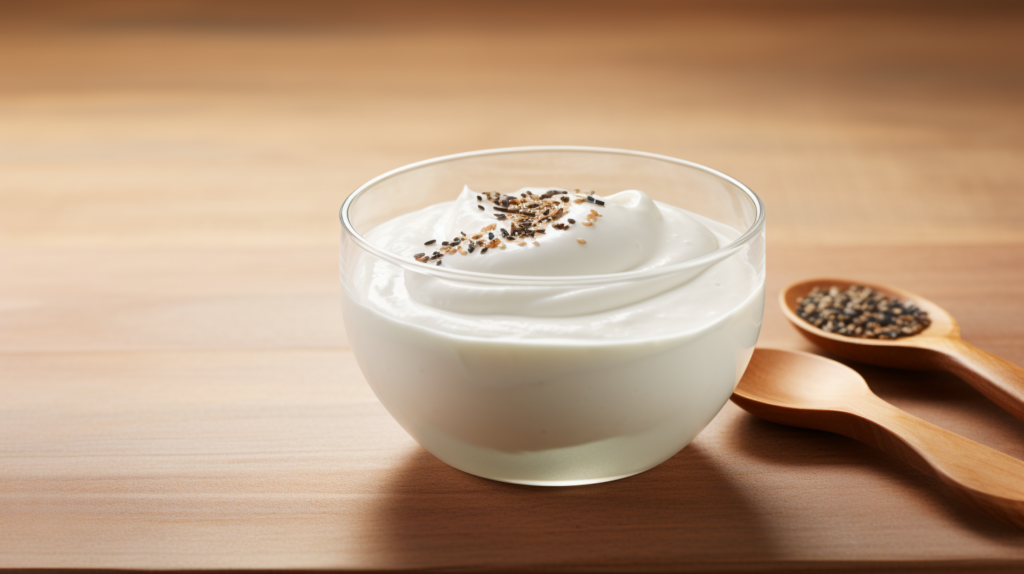
How to Incorporate Flax Seeds into Your Diet
Om du vill skörda frukterna av health benefits of flax seeds, there are plenty of delicious and easy ways to incorporate them into your daily diet. Here are some tips:
- Add a tablespoon of ground flax seeds to your morning smoothie
- Sprinkle whole or ground flax seeds onto your cereal or yogurt
- Mix them into your favorite muffin or pancake batter
- Stir them into your oatmeal or overnight oats
- Use flaxseed oil as a dressing for salads or roasted vegetables
Keep in mind that flax seeds are best consumed ground, as whole seeds may pass through your digestive system without being fully broken down. You can purchase pre-ground flax seeds or grind them yourself using a blender or coffee grinder.
Flax Seeds: Precautions and Potential Side Effects
While flax seeds offer numerous health benefits, it is essential to exercise caution when incorporating them into your diet. Here are a few potential precautions to consider:
- Allergier: If you have a history of allergies to seeds or nuts, you may be at a higher risk of developing an allergic reaction to flax seeds.
- Problem med matsmältningen: Some individuals may experience digestive issues such as bloating, gas, or diarrhea when consuming flax seeds.
- Moderation: While flax seeds are highly nutritious, it’s essential to remember that they are also high in calories. Consuming too many flax seeds can lead to weight gain, so it’s important to consume them in moderation.
It’s always best to consult with your healthcare provider before making any significant changes to your diet. They can help you determine if consuming flax seeds is right for you.

The Power of Flax Seeds for Overall Health
Incorporating flax seeds into your diet can have numerous health benefits. Flax seeds are a great natural way to regulate blood pressure and hormone levels, and they are packed with essential nutrients that contribute to overall health and wellness.
Flax seeds are a rich source of omega-3 fatty acids, fiber, and lignans. These nutrients promote a healthy heart, help regulate hormonal balance, aid in weight loss efforts, and contribute to healthy skin and hair. Additionally, flax seeds have been shown to improve digestive health and support women’s health.
There are many ways to incorporate flax seeds into your daily diet. You can add them to smoothies, sprinkle them on cereals, salads, or yogurt, or even bake them into muffins and bread. By including flax seeds in your meals, you can easily reap their numerous health benefits.
However, it is important to note that excessive consumption of flax seeds can have some side effects, such as digestive issues and allergies. It is always best to consume flax seeds in moderation and speak with a healthcare professional if you have any concerns.
In conclusion, adding flax seeds to your diet is an easy and effective way to improve your overall health and wellbeing. By taking advantage of the health benefits of flax seeds, you can naturally regulate your blood pressure and hormone levels, promote heart health, support digestive health, and enjoy healthy skin and hair.
VANLIGA FRÅGOR
Q: What are the health benefits of flax seeds?
A: Flax seeds have numerous health benefits, including their ability to regulate blood pressure and hormone levels naturally. They are also rich in essential nutrients such as omega-3 fatty acids, fiber, and lignans.
Q: How can flax seeds regulate blood pressure?
A: Flax seeds contain compounds that have been shown to help lower blood pressure. The omega-3 fatty acids in flax seeds can help reduce inflammation in the body, which can contribute to healthier blood pressure levels.
Q: Can flax seeds help balance hormones?
A: Yes, flax seeds have phytoestrogenic properties that can help regulate hormone levels in the body. They may be particularly beneficial for managing menopausal symptoms, supporting reproductive health, and promoting overall hormone balance.
Q: Do flax seeds aid in weight loss?
A: Flax seeds can be a helpful addition to a weight loss diet. Their high fiber content promotes feelings of fullness, helping to curb appetite. Additionally, they may have an impact on metabolism and fat burning.
Q: How can flax seeds benefit the skin?
A: Flax seeds have anti-inflammatory properties and can promote hydration, which can be beneficial for skin health. They may help reduce symptoms of conditions such as eczema and acne.
Q: Are flax seeds good for digestion?
A: Yes, flax seeds are rich in fiber, which can promote regular bowel movements, prevent constipation, and support overall digestive health.
Q: What are the specific benefits of flax seeds for women’s health?
A: Flax seeds can have positive effects on women’s health, including managing menstrual symptoms, supporting reproductive health, and reducing the risk of certain hormone-related cancers.
Q: Can flax seeds help with hair growth?
A: Flax seeds contain omega-3 fatty acids, which are essential for healthy hair follicles and scalp. Including flax seeds in your diet may help promote hair growth and overall hair health.
Q: How can I incorporate flax seeds into my diet?
A: There are many ways to incorporate flax seeds into your diet. You can add them to smoothies, sprinkle them on top of cereals or yogurt, include them in baked goods, or even use flaxseed oil in salad dressings.
Q: Are there any precautions or side effects associated with consuming flax seeds?
A: While flax seeds are generally safe for most individuals, some people may have allergies or experience digestive issues when consuming them. It’s important to start with a small amount and monitor your body’s response. Additionally, moderation in consumption is advised.














